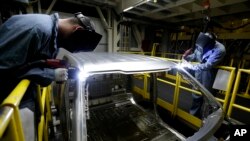The productivity of American workers rose in the July-September quarter at the fastest pace in two years, while labor costs slowed.
Productivity increased at a 3.1 percent rate in the third quarter, the Labor Department reported Thursday. It was a significant improvement from the previous three quarters, when productivity had fallen. Unit labor costs edged up a modest 0.3 percent in the third quarter, compared with a 3.9 percent jump in the second quarter.
The productivity figure was the best showing since a 4.2 percent gain in the third quarter of 2014. But the rebound was expected to be temporary. Strong gains in productivity are needed to boost Americans' living standards.
Economists forecast that productivity will quickly fall back to the tepid gains seen since the 2007-09 recession.
"Following the burst of faster productivity growth during the late 1990s, which is usually attributed to the incorporation of desktop PCs into the workplace and the internet, productivity growth has slowed again in most developed countries," said Paul Ashworth, chief U.S. economist at Capital Economics. "The longer this slowdown goes on for, the less confident we are of another technology-related acceleration."
The latest productivity gains had been expected, given that overall economic growth rebounded in the third quarter after anemic gains in the first half of the year. The gross domestic product, the nation's total output of goods and services, increased at a 2.9 percent rate in the third quarter, more than double the pace in the second quarter.
Productivity represents the amount of output per hour of work. Nonfarm businesses boosted output by 3.4 percent in the third quarter, while the hours worked rose a much more modest 0.3 percent.
Productivity growth has been weak since the Great Recession. It has averaged annual gains of just 1.3 percent from 2007 through 2015, sharply lower than the 4.7 percent average annual productivity gains from 2000 to 2007.
Federal Reserve Chair Janet Yellen has pointed to the slowdown in productivity growth as a key challenge facing the country.
Economists believe that businesses need to start focusing more on raising the efficiency of their existing workforce rather than just hiring more workers to meet demand. They expect companies to put more emphasis on increasing productivity as the labor market hits full employment and the pool of available qualified workers diminishes.




